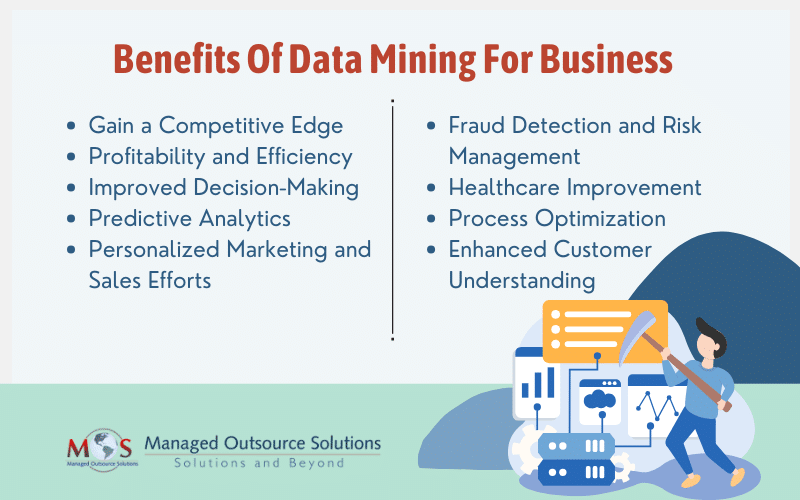Data mining facilitates the process of identifying information that would be beneficial to a business by extracting key details from a large amount of data. Data mining assists businesses in making critical decisions by transforming unprocessed data into insightful knowledge. Data mining, for example, is very helpful in marketing. In order to create marketing campaigns that target customers in these market segments, it can assist businesses in identifying the market segments that have the potential to yield higher profits. Customer relationships are established and maintained with the help of information retrieved through data mining.
Data collection and storage volume is increasing. Raw data is transformed into insightful knowledge via data mining. In order to find patterns and correlations and ultimately inform strategic planning and decision-making, this complex process entails the collection and analysis of data. Through data mining services, companies can acquire the knowledge necessary to successfully use data. Businesses that specialize in the area can assist you in identifying and evaluating trends, patterns, and important insights from your sizable, intricate datasets.
Advantages of Data Mining for Business

Gain a Competitive Edge
Businesses can access their vast datasets more easily with the aid of effective data mining, which uncovers hidden patterns and insightful information about customer preferences, changing consumer behavior, and emerging market trends. Businesses can stay ahead of competitors, innovate, and modify their strategies to suit changing market demands thanks to this competitive advantage, which eventually leads to business success.
Netflix, a well-known streaming service, is the ideal illustration of a business that successfully uses data mining to obtain a competitive edge. When and what viewers watch, how long they watch, what device they use, and even when they pause or rewind are all tracked by Netflix. They evaluate user behavior and preferences using data mining and machine learning algorithms, then provide tailored recommendations for every user. Maintaining user engagement increases revenue.
Profitability and Efficiency
Data mining guarantees that an organization is gathering and examining trustworthy data. It is frequently a more rigorous, structured procedure that formally defines an issue, collects relevant data, and works to develop a solution. As a result, data mining enhances a company’s operational strength, efficiency, and profitability.
Improved Decision-making
Businesses can learn a great deal about consumer behavior, market trends, product performance, and operational efficiency by examining vast amounts of historical and current data. Based on the knowledge gained from the data, they can make wise decisions that will produce better results. Data-driven decisions produce better results, whether they are used to optimize marketing campaigns, improve customer experiences, or refine product offerings.
Predictive Analytics
Predictive analytics, which helps businesses foresee future trends and outcomes, is made possible by data mining. Among other things, demand forecasting, inventory control, and risk assessment can all benefit from this.
To improve its operations and customer experience, for instance, the massive e-commerce and technology company Amazon relies heavily on data mining and predictive analytics. Amazon is able to provide product recommendations by looking at the browsing and purchase history of users. They can also anticipate product demand and optimize inventory levels thanks to data mining, which lowers storage costs and guarantees that goods will be available when customers need them.
Personalized Marketing and Sales Efforts
Businesses can identify and target specific customer segments with individualized marketing and sales efforts. They can develop focused marketing campaigns, suggest pertinent goods or services, and enhance their pricing and promotional tactics by evaluating consumer data. Increased sales, better business performance, and higher conversion rates are the results of this focused approach to marketing and sales.
Fraud Detection and Risk Management
Data mining plays a vital role in fraud detection and aids in risk assessment and mitigation across a range of industries, including finance and insurance. Businesses can quickly identify potential risks and suspicious activity by analyzing transaction data to find anomalies. After that, they can take action to lessen these problems and reduce monetary losses. Successful risk management and fraud detection help to preserve a safe working environment, safeguard assets, and guarantee company success.
Healthcare Improvement
Mining and analyzing patient data can be used in the healthcare sector to forecast the chance of a disease developing or progressing. For instance, risk factors and early symptoms of diseases like diabetes, cancer, or heart disease may be found by examining data from patient histories and electronic health records (EHRs). Healthcare practitioners can intervene at an early stage and provide more effective treatment and better patient outcomes by identifying these patterns. Additionally, by examining clinical histories and genetic data, a customized treatment plan can be made for each patient, increasing the likelihood of positive results.
Process Optimization
Business process bottlenecks and inefficiencies can be identified through data mining. Businesses can lower expenses, increase productivity, and improve customer satisfaction by streamlining these processes. For instance, a retail business should gather a tonne of information about all aspects of its supply chain operations, such as order fulfillment, delivery, inventory management, and procurement, in order to increase the efficiency of its supply chain. Through data mining, they can pinpoint inefficiencies and bottlenecks and implement targeted measures to optimize their supply chain procedures.
Innovative Product Development
Data mining can help with the development of creative goods and services. In order to develop innovative and profitable products and services, businesses need to be able to recognize opportunities, comprehend client needs, optimize processes, and reduce risks. Businesses can develop creative solutions that satisfy consumer needs and market demands by examining customer feedback and market trends.
Enhanced Customer Understanding
Through the analysis of consumer behavior, preferences, and demographics, data mining enables businesses to comprehend their clientele more thoroughly. With the help of this knowledge, companies can better customize their marketing campaigns, offerings, and products to the needs of their target market, boosting client happiness and loyalty.
The best method to get insightful information out of your data is to collaborate with a business process outsourcing company that provides data mining solutions. Selecting an organization that prioritizes data security and compliance, and has experience, expertise, and a proven track record in your particular industry is essential for business success.
Harness Your Data Potential!
Future-proof your business by investing in data mining services today.




